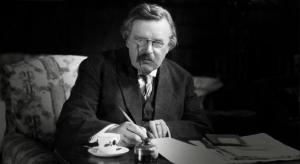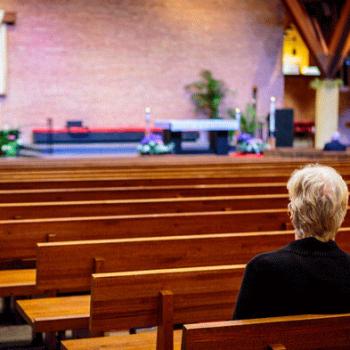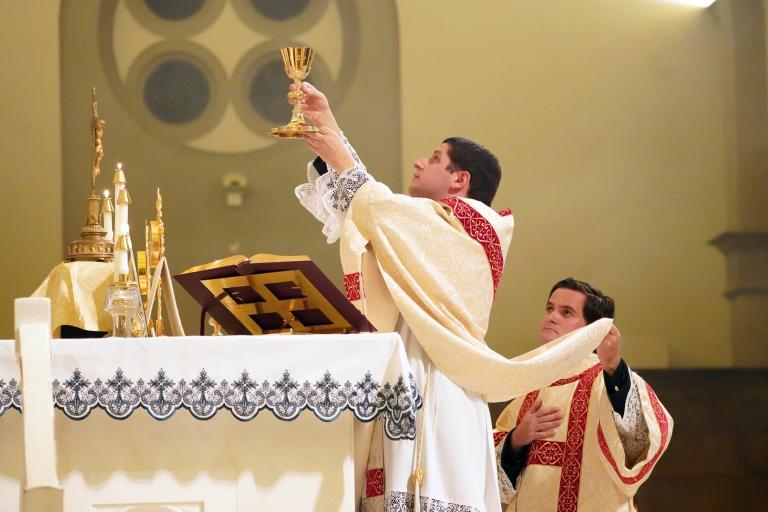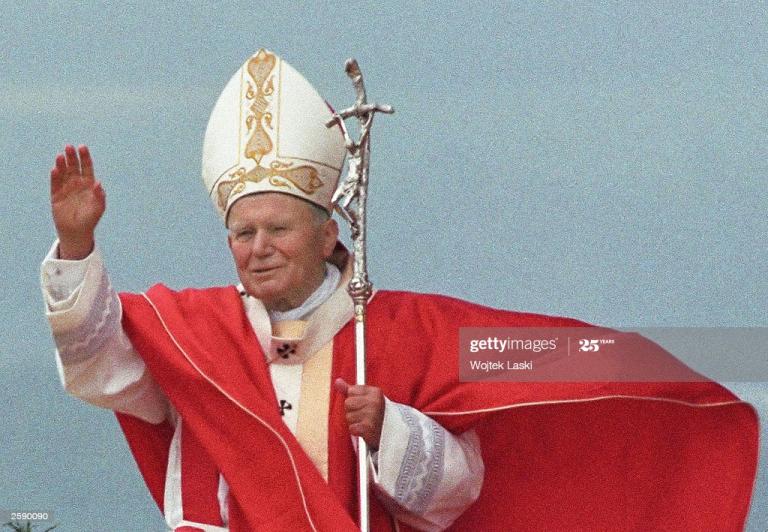
Bishop’s Letter of Rejection
Bishop Peter Doyle from the United Kingdom Diocese Of Northampton has decided not to pursue the investigation of the possible sainthood of G. K. Chesterton. What an incredibly stupid and shortsighted decision. The reasons are threefold—no local cult of devotion, no pattern of person spirituality, and a thread of anti semitism in his writings. One wonders if the good bishop has ever really read Chesterton. For the sake of a man who cannot speak for himself, let’s look at the charges, for that is what the bishop made them sound like.
Strike One: No Local Cult Of Devotion
First, apparently there is not a local cult of devotion to Chesterton in his home diocese. Really? This is one of the most famous man of letters of the 20th century and no one in the diocese thinks him as worthy of sainthood or devotion? Doubt it. What about his millions of devoted followers, amazed at his holiness, around the world? Let’s note the fact that the sainthood process for St. John Paul II and St. (Mother) Teresa was much more predicated on the millions of devotees around the world who asked that these two be made saints than any local cult. So, Bishop, don’t drop the matter simply because the fire of devotion to G. K. may not burn brightly in Northampton.
Strike Two: No Personal Pattern Of Spirituality
Which brings us to the second charge—no personal pattern of spirituality. Guess the bishop is simply ignorant of the coherent spirituality present in the author’s hundreds of essays, non-fiction books and novels, particularly the Father Brown stories which helped form my own spirituality. Frankly, I simply don’t understand this. Because he was a columnist, journalist, novelist, apologist, etc., one will have to use different methods to categorize his spirituality. Please, give me a year and I’ll be happy to turn out a coherent, researched, well-documented paper on Chestertonian spirituality.
Strike Three: Anti-semitism
And the third charge–anti semitism. If we were to apply the bishop’s opinion worldwide, every Catholic saint before Vatican II’s Nostrae Aetate would be disenfranchised. He does not think some of Chesterton’s quotes would past muster today in our apparently more enlightened and Jewish tolerant world. What a joke. The bishop simply doesn’t want to take the time to research and reach a scholarly opinion on what those time conditioned statements might mean in the context of Chesterton’s spirituality. Oh that’s right, he didn’t have one.
Mediocre Island Hierarchy Rejects Saints With Spines
The mediocrity of the British hierarchy is once again on display in its inability to recognize that generations of Catholics have had their faith strengthened and many Protestants have been brought to the faith by this amazing man. It may seem harsh to accuse them of backbones composed mostly of pudding, but, good heavens, it took them over a century to get Cardinal Newman sainted–and he will most likely become not only saint but a doctor of the Church. I fear the bishop and his comrades can’t stand someone who spoke the truth clearly and eloquently, defended the Catholic faith, and helped restore its credibility to the United Kingdom firstly and then the rest of the world. Chesterton is not a minor Catholic character of the twentieth century. The bishop basically proclaimed him such, but the reasons given seem rather more to be an attempt to assassinate the faith and integrity of a true saint of God. In this ecclesiastical kerfluffle, the island Catholic hierarchy looks more and more like their Anglican counterparts, and like them, appear to becoming as useless. Fortunately, this is not the last word. If God wants Chesterton to be a saint, Bishop Doyle’s conclusions will be simply a confusing fog of incoherence to be dispelled by some more enlightened cleric.
UPDATE… UPDATE….. UPDATE.8/6/19. Original letter from Bishop to Dale Ahlquist. Dale’s
FOR IMMEDIATE RELEASE
MINNEAPOLIS, Minnesota (August 5, 2019 – Feast of Our Lady of the Snows) On August 1, 2019, at the 38th Annual Chesterton Conference, held this year in Kansas City, I read to the 500 attendees the following letter from Bishop Peter Doyle of Northampton, England, a man who has always shown me the greatest kindness and respect:
Dear Dale, … This is not a letter I find easy to write, and I know that you will not find it easy to receive.
As you know, Canon John Udris completed a preliminary investigation into the cause of G K Chesterton last summer. Since that time, I have consulted on John’s findings, a wonderfully thorough and supportive study, and I have prayed much about the issue. I also went with some of the Bishops of England and Wales to see the Congregation for the Cause of Saints during our Ad Limina visit in the last week of September 2018.
I am very conscious of the devotion to G K Chesterton in many parts of the world and of his inspiring influence on so many people, and this makes it difficult to communicate the conclusion to which I have come.
That conclusion is that I am unable to promote the cause of G K Chesterton for three reasons. Firstly, and most importantly, there is no local cult. Secondly, I have been unable to tease out a pattern of personal spirituality. And, thirdly, even allowing for the context of G K Chesterton’s time, the issue of anti-Semitism is a real obstacle particularly at this time in the United Kingdom.
As a very unworthy servant of the Church, I recognise Chesterton’s goodness and his ability to evangelise but, in my heart of hearts, I believe that he himself would not want any fuss other than asking his prayers for the Church today and praying for him.
I realise that this is very disappointing for you and for the vast number of people around the world who have such a high regard for Chesterton, and I think particularly of the American Chestertonian Society.
I have no doubt that you will seek new ways to promote Chesterton’s cause, and I would not want to stand in the way other than stating, as the local Bishop, my own conclusions.
Be sure of my prayers for you and your family and for the Society of Gilbert Keith Chesterton and the Chesterton Schools Network.
With every blessing
Yours sincerely in Christ,
Peter
Bishop of Northampton
Although I had received this letter back in April, this was the first public mention of it. The next day the Catholic Herald in England reported the story, and the Catholic press around the world picked it up. In my reply to the Bishop, I expressed my sympathy for the difficulty of his task and told him I was indeed disappointed but not discouraged. I added that Chestertonians would, as he predicted, continue to do everything we can to promote Chesterton’s canonization. I did add that no saint would ever endorse his own cause, least of all, the humble bard of Beaconsfield. The bishop immediately responded agreeing with that last point.
Just before the conference, I wrote to him and told him that we would be discussing this issue at our conference, and I asked for his prayers. He responded and said he would say a Mass for the conference and the Society of Gilbert Keith Chesterton.
I would like – as succinctly as possible – to address the Bishop’s objections because they will be important to others as well.
First, there is a local cult. It was the Senior Deacon (now deceased) of the Diocese of Northampton who first appealed to the Bishop to open Chesterton’s cause, saying, “We need his holiness.” There is a group based in London called The Catholic Chesterton Society, led by Stuart McCullough, whose conversion story is told in our recent book My Name is Lazarus – 37 Stories of Converts Whose Path to Rome was Paved by G.K. Chesterton. Every June, pilgrims walk and pray from London to Beaconsfield, culminating at Chesterton’s grave. The Catholic Chesterton Society has translated the prayer for Chesterton’s intercession into more than 20 languages.
There is also a universal cult. We have distributed over 25,000 prayer cards, and we get daily requests for more. The cult is growing and does not show any signs of slowing down. People all over the world are devoted to Chesterton, asking for his intercession because they have been touched and transformed by his wisdom and goodness. He brings people to Christ.
The second objection – the lack of a clear pattern of spirituality – reveals the difficulty of getting a lay person canonized. At the conference I stumped the audience when I gave them five names and asked what the five people had in common. It turns out they all had lived during Chesterton’s time, they had all been Catholic priests, they had all founded religious orders, and they were all canonized within the last 30 years. And no one knew who they were. Clearly, there is little difficulty in discerning the spiritual pattern, as it were, of the founder of a religious order. But G.K. Chesterton did not write about his own spiritual life, and he did not found a religious order, telling his followers how they should live. Rather, he revealed his spirituality in his writings and in his life, in his love for the Sacraments, in his abiding sense of wonder and joy, and in his tireless labor for social and political reform. He lived a theology of thanks. He is the model of lay spirituality.
I might add that I have been giving retreats based on Chesterton’s very coherent spirituality for some years.
The third objection is the most disappointing because it has been addressed repeatedly, including by great scholars of Chesterton and his time. Chesterton was not anti-Semitic. A man who not only physically defended the Jews when they were attacked (read his Autobiography) but repeatedly spoke out against their persecution in Germany, in Russia, and in England, who said “The world owes God to the Jews,” and “I will die defending the last Jew in Europe,” should not have this poisonous epithet anywhere near his good name. I am pleased that the Bishop does not make the accusation, but he says that there is an “issue.” While Chesterton’s writings are amazingly fresh and vital, there is no question that he occasionally says things that are awkward by our modern standards of political correctness (and the Bishop makes this allowance as well). However, an issue being “sensitive” should not stand in the way of proceeding with the Cause. It simply needs to be dealt with honestly, fairly, courageously and charitably. In addition to the fact that there are many Jewish converts, drawn to the faith by none other than G.K. Chesterton, I wish to emphasize that there is not a wisp of hostility toward the Jews in our Apostolate. We are saddened when anyone repeats the falsehood that Chesterton was anti-Semitic.
It is fitting that Chesterton, who made a living as a controversialist, should continue to find himself controversial. But if anything, that is proof of his abiding presence. It is also evidence that he belongs in that controversial group, the Communion of the Saints.
My recent book Knight of the Holy Ghost – A Short History of G.K. Chesterton addresses these issues more fully and makes a strong case for Chesterton’s sanctity. I have previously sent both this book and My Name is Lazarus to the Bishop.
While Bishop Peter Doyle was always gracious and kind to me, I was aware of the fact that he did not have any enthusiasm for Chesterton and by his own admission did not really know much about him. Although I tried to give him the knowledge, I could not give him the enthusiasm. It was my hope that the Prophet would be honored in his own country. Although it is clear Bishop Doyle will not be opening the Cause of Canonization for G.K. Chesterton, this does not mean the cause is dead. We are confident that, in time, it will open, under a different ordinary and perhaps in a different diocese, which is a possibility under canon law.
In the meantime, we ask that those who are disappointed by the announcement to be charitable and supportive of the Bishop of Northampton. He is praying for us. Let us return the favor.
Dr. Dale Ahlquist
President, Society of Gilbert Keith ChesertonNote: this statement may be reprinted elsewhere without modification.
Here’s the article from CNA:
.- A cause for the canonization of the pipe-smoking, plain-talking, mustachioed and beloved Catholic author Gilbert Keith (GK) Chesterton will not be opened, announced Bishop Peter Doyle of Northampton, the late Chesterton’s home diocese.
Despite Chesterton’s inspirational writings and his role in the Catholic revival in England during the early 20th century, several obstacles stand in the way of advancing the author’s cause for canonization, Doyle said in a letter read to the opening session of the American GK Chesterton Society conference.
The three concerns cited by Doyle are that Chesterton lacks a “cult” of local devotion, the lack of a “pattern of personal spirituality” that could be discerned through his writing, and charges of anti-Semitism in his writing.
“I am very conscious of the devotion to GK Chesterton in many parts of the world and of his inspiring influence on so many people, and this makes it difficult to communicate the conclusion to which I have come,” the bishop said, according to the Catholic Herald in the U.K.
Chesterton was born in 1874, and became a prolific writer and staunch Catholic apologist after his conversion to the faith. He is renowned for writing apologetic classics such as “Orthodoxy” and “The Everlasting Man”, as well as for his fictional “Father Brown” series, among many other works. He died in 1936.
Doyle praised “Chesterton’s goodness and his ability to evangelize” but said he could not open the cause at this time.
“…I am unable to promote the cause of GK Chesterton for three reasons. Firstly, and most importantly, there is no local cult. Secondly, I have been unable to tease out a pattern of personal spirituality. And, thirdly, even allowing for the context of G K Chesterton’s time, the issue of anti-Semitism is a real obstacle particularly at this time in the United Kingdom,” he said in the letter.
In an interview with Alfa y Omega, a Spanish Catholic weekly, Doyle said that while Chesterton was staunchly against the Nazis, he stereotyped Jewish people in concerning ways in some of his writings.
As an example, Alfa y Omega noted, in The New Jerusalem, a book written in 1920 by Chesterton, he argued that Jewish people needed to have a separate nation in order to “live, as far as possible, in a Jewish society ruled by the Jews.” He also advocated that Jews wear distinctive clothing in public to set them apart.
The Society of Gilbert Keith Chesterton argues that the charge of anti-Semitism against Chesterton is false, given that the man once said “The world owes God to the Jews,” and “I will die defending the last Jew in Europe.”
Chesterton was “a man who hated racism and racial theories and who fought for human dignity and always affirmed the brotherhood of all men,” the society states on its website.
Fr. John Udris, who served as the investigator for Chesterton’s cause, told the Catholic Herald that he “(doesn’t) envy Bishop Peter having to make a decision with such huge implications.”
“Of course it’s a disappointment. But the investigation was an enormous privilege. Getting to know Chesterton better has certainly changed me for good (I hope in both senses!),” he added.
Fr. Benedict Kiely, a priest who claims Chesterton’s intercession helped cure his mother of sepsis, said that the decision shows that the English Catholic hierarchy is in a “fog of mediocrity,” a phrase first applied to the group by English author Hilaire Belloc.
“The decision of the current Bishop of Northampton not to pursue the cause of G.K. Chesterton’s canonisation indicates the fog has yet to clear,” Kiely told the Catholic Herald.
According to his interview with Alfa y Omega, Doyle said that it is possible that his successor could re-open the cause. Doyle is 75 and has presented his resignation for consideration to Pope Francis, as he is the customary retirement age for a bishop.
“And I would not want to be an obstacle to this, beyond stating the conclusions I have reached,” he said.













